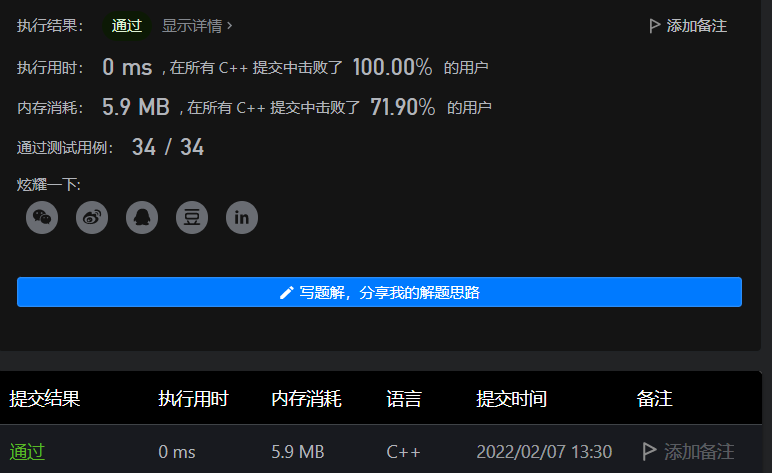Li Kou daily question 20207
Topic description
If the string does not contain any strings such as' aaa ',' bbb 'or' ccc 'as substrings, the string is a "happy string".
Here are three integers a, b and c. please return any string s that meets all the following conditions:
s is a happy string as long as possible. There are at most a letter 'a', b letter 'B', and c letter 'c' in s. s contains only
'a', 'b' and 'c'. If such a string s does not exist, return an empty string
Where 0 < = a, B, C < = 100
a + b + c > 0"".
Link: Force buckle 1405 Longest happy string
Solution: according to the meaning of this question, it is easy to think of the depth first search algorithm, namely dfs + pruning. At this time, the time complexity of the algorithm should be O (3^max(a,b,c)). Unfortunately, due to the range of parameters a, b and C, the execution time of the algorithm is slow, resulting in the final result of TLE.
The code is:
class Solution {
public:
string ans;
int Max;
string x;
int num[3];
string longestDiverseString(int a, int b, int c) {
map<char, int> s;
s['a'] = 1;
s['b'] = 1;
s['c'] = 1;
Max = 0;
ans = "";
x = "";
num[0] = a;
num[1] = b; num[2] = c;
getLong(s,-1);
return ans;
}
void getLong(map<char, int> s,int alpha)
{
int i;
if (s['a'] == 3)
{
if (Max < x.length())
{
Max = x.length()-1;
ans = x.substr(0,x.length()-1);
}
return;
}
if (s['b'] == 3)
{
if (Max < x.length())
{
Max = x.length() - 1;
ans = x.substr(0, x.length() - 1);
}
return;
}
if (s['c'] == 3)
{
if (Max < x.length())
{
Max = x.length() - 1;
ans = x.substr(0, x.length() - 1);
}
return;
}
for (i = 0; i < 3; i++)
if (num[i] != 0)
break;
if (i == 3) {
Max = x.length();
ans = x;
return;
}
for (int i = 0; i < 3; i++)
{
if (num[i] > 0)
{
num[i]--;
if (x.length() != 0 && x[x.length() - 1] - 'a' == i)
s['a' + i]++;
else if (x.length() != 0) {
s['a' + i] = 1;
}
x += 'a' + i;
getLong(s,i);
x = x.substr(0, x.length() - 1);
if (x.length() != 0 && x[x.length() - 1] - 'a' == i)
s['a' + i]--;
num[i]++;
}
}
}
};
The implementation results are:

Finally found that this is not a dfs, but a greedy!!!
You can look at the conditions of this topic first:
- The consecutive number of each letter cannot exceed 3;
- The number of letters is limited
The final result is the longest string, so it is easy to think of greedy strategy:
Letters with less numbers are used as isolated letters, and letters with more numbers are prioritized; If the current number of letters exceeds 3, skip the current letter until the current letter that can be added is found; If you can't find the letters that can be added at present, exit.
The code is:
class Solution {
public:
class mycomp2 {
public:
bool operator() (pair<char, int> a, pair<char, int> b) {
return (a.second > b.second);
}
};
string longestDiverseString(int a, int b, int c) {
string ans;
vector<pair<char, int>> s = { {'a',a},{'b',b},{'c',c} };
while (1) {
bool flag = false;
sort(s.begin(), s.begin()+s.size(), mycomp2());
for (vector<pair<char, int>>::iterator it = s.begin(); it != s.end(); it++) {
int m = ans.size();
char ch = (*it).first;
int freq = (*it).second;
if (freq <= 0)
break;
if (m >= 2 && ans[m - 2] == ch && ans[m - 1] == ch)
continue;
ans.push_back(ch);
flag = 1;
(*it).second--;
break;
}
if (!flag)
break;
}
return ans;
}
};
The final operation result is:

If greedy is adopted, the time complexity is greatly reduced. The main time is in sorting. If sort function is adopted, the time complexity is O((a+b+c) × ClogC).
Overview of this problem, found that the use of violence algorithm did not complete this problem well, it is easy to TLE; You still need to exercise your greed or dp logical thinking!